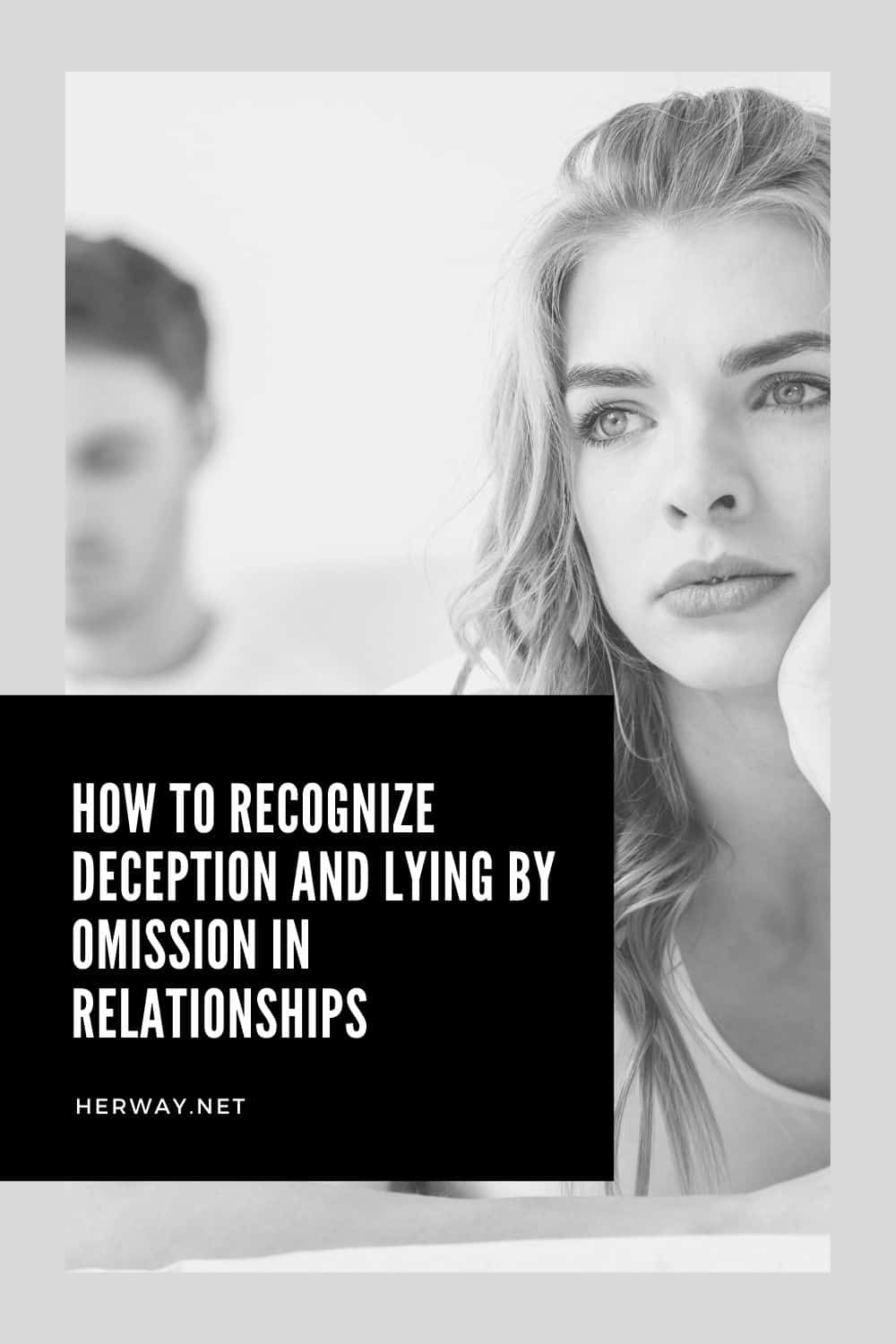“The slickest way in the world to lie is to tell the right amount of truth at the right time – and then shut up.”―Robert A. Heinlein
Yes, lying by omission is the slickest, most efficient, and smoothest way to deceive and lie. Still, that doesn’t make it okay.
The definition of lying by omission goes something like the following: leaving out important, relevant facts in conversation in order to foster a misconception.
Many wonder if it’s even really lying when you lie by omission. Let’s find out whether omission actually is lying and how it destroys relationships.
Is omission a lie and why do people even practice lying by omission?
“It is not only what we do, but also what we do not do, for which we are accountable.”―Molière
So, is omission lying? It sure is. It belongs to 7 types of lies:
Omission – a person leaves out information that is relevant to how the whole situation is perceived.
Error – a person truly believes they are telling the truth. They made a mistake and their words aren’t true even though they believe they are.
Restructuring – a person alters the scene in a way that makes them less involved.
Denial – a person refuses or doesn’t have the ability to accept the truth. They’re usually also lying to themselves.
Minimization – a person reduces the effects of whatever happened.
Exaggeration – a person builds up the story in a way that suits them to look their best or uses unnecessary hyperboles.
Fabrication – a person invents a whole story and tells a complete lie (these lies are called lies of commission).
Omission seems to be one of the most innocent ways of lying. Even a lie detector wouldn’t pick those kinds of lies up since they aren’t even false statements, they’re just incomplete truths.
Still, it seems like lies of omission aren’t any easier to deal with when they’re used in romantic relationships. Why does it hurt so bad?
We’ll get into the details, but the ultimate reason is that the person who’s being deceived or having secrets kept from them feels intentionally hurt by their loved one, who obviously has very little respect for them as they’ve chosen to let them live in a false reality.
Why do people even choose to skip some parts of the truth?
1) Because of fear. They don’t want to be on the receiving end of anger or any kind of punishment they think may follow if they tell the complete truth.
2) They feel guilty for the thing they did that they aren’t willing to openly speak about and think hiding it is the best choice.
3) They are ashamed of what they did and don’t want their loved ones to perceive them differently.
These are some of the most common phrases a person who has lied by omission will use when their secret is uncovered:
“I just couldn’t bear to tell you!”
“It didn’t seem like important information to share at the moment.“
“I didn’t actually lie, I just didn’t say anything.”
“I didn’t want to hurt your feelings.“
“I was afraid of what you would say!”
While they may all make perfect sense, lying by omission is still lying and it hurts pretty bad.
So, what is it about lying by omission that cuts so deep? Let’s find out.
6 Reasons Lying By Omission In A Relationship Is Destructive
1. Omissions lead to cover up lies that can be hard to follow
When a person chooses to tell half-truths, more often than not their story leaves some unanswered questions.
To the partner who’s having a secret kept from them the whole thing may seem illogical and they usually start asking additional questions just so they can have a clear understanding of what’s going on.
The person who’s keeping the secret, in an attempt to keep their secret, tells lies that weren’t a part of their original plan.
Those complicate the situation even further, creating a messy, dark atmosphere in the relationship.
2. The person who’s holding a secret feels uncomfortable and guilty
Even though telling the truth might not change the relationship as much as the deceiver believes it would, the whole omitting experience does.
Unless they’re a psychopath, the partner who’s keeping a secret will start feeling guilty about the things they didn’t say.
A person who feels guilty continues ruining the relationship in many different ways, and their first lie of omission is only a starting point for what comes after.
3. Lies of omission and secrets create a barrier to connection
To be able to tell the truth even when you know it won’t make you look good, you have to feel like you’re in a safe environment.
If a person who’s generally not a liar and deceiver chooses to omit something, it might mean that they’re actually having trust issues.
Once the lie is out there, it blocks true intimacy.
The secret holder feels all kinds of disturbing emotions and is unable to open up in any other aspect of the relationship because the lie or the omitted truth is blocking them from doing so.
In these situations, closeness is avoided and there’s usually a decrease in conversation and physical intimacy which means that the sexual relationship between two people fades as well.
It’s impossible to maintain a healthy relationship with clear communication and strong connection without being completely honest with each other.
Lies of omission destroy intimacy and that’s probably their most destructive influence in relationships (or should I say toxic relationships).
4. Deception destroys the self-esteem of both people in the relationship
The person who chooses to lie may begin questioning themselves completely, especially if it’s the first time they did something like that.
Feeling awful and guilty about doing something inconsiderate to their partner makes them feel like bad people and they have a hard time accepting what they’ve done but still can’t seem to find a way to tell the truth.
This slowly ruins their self-esteem.
For the one on the receiving end of the untruth, their self-esteem can be ruined by two different aspects of omission.
The first aspect of omission is when the lie is not yet discovered.
Sometimes, things don’t add up for them, and they feel distrusting, suspicious, and generally weird, which can make them think there’s something wrong with them.
The other aspect of omission is after the secret is discovered, where the person obviously feels many different things that we’ll talk about in just a minute.
The array of negative emotions causes their self-esteem to decrease.
5. The person who was lied to feels too many negative emotions to count
After the person who was lied to discovers the truth they go through a major self-questioning process. There’s so much happening in their mind.
First, they feel confused and they can even be in denial about what happened.
Then, they feel abandoned by the person they love and who they believed loved them. They suddenly feel like they can’t trust anything or anyone.
They feel less perceptive or even stupid for not figuring out that they were being lied to earlier. They start feeling angry both at their partner but also at themselves.
All these emotions are too much to deal with and they often develop anxiety over the whole situation.
Being deceived by a loved one is very difficult to deal with.
Even if they can bring themselves to forgive and forget, the mark on their psyche remains forever and causes them to have trust issues and be more suspicious and nervous in the future.
6. The way a liar deals with guilt creates even more damage than the actual lie
Managing guilt and shame creates many new problems. The secret holder, by hiding a secret, begins to hide more and more of who they are each day.
In order to justify their actions (and deal with what they’ve done), they may withdraw, grow resentful of their partner, become incredibly critical or judgmental, highly irritable, or even aggressive.
Lying creates inner conflict for them and they use many psychological tools to deal with it.
More often than not they become distant and unreachable to their partner, which causes the relationship to fall apart on its own, without the lie even being discovered.
Everyone who’s afraid of telling the truth should think about this before they decide that lying is easier because it’s so much more complicated than it seems.
If you’re thinking that your partner might be telling you half-truths and letting you believe something that isn’t (completely) true, read about these signs to find out if you’re right.
7 Subtle Signs Your Partner Might Be Deceitful
1. They’re open about using little lies or white lies
They’re perfectly okay with using fibs all the time. They don’t even find it uncomfortable having to tell a white lie, it’s simply the way they function.
Little lies are something they believe to be necessary and they don’t even consider telling the truth whenever the truth might be even slightly more complicated to deal with than a lie.
They’re obviously capable of lying with a straight face and little lies are the most natural part of their everyday life.
2. Their behavior in past relationships is less than admirable
You know that they used to lie or deceive their ex-partners. Someone who was able to that once is almost certainly able to do it again.
It’s not necessarily true that they will do it, but you definitely have to watch out a bit more than you would with a partner who has always been open and honest in their relationships.
3. They lived in a family where it was okay or necessary to have secrets
There are two different cases here:
1) Your partner comes from a family where one parent encouraged them to lie to the other parent or other people in general.
They think it’s okay to tell lies that seem irrelevant to them because that’s the way they were brought up.
Their family has functioned that way since they can remember and they were never taught to always be sincere.
Their parent(s) might have told them that it’s okay to lie in order not to hurt someone or in order to avoid confrontation.
2) Your partner comes from a family where they had to develop a coping mechanism to deal with overly controlling parents.
Their parents wouldn’t accept that they were growing up and wanted to do certain things so they used to lie to avoid punishment or anger.
Also, it’s possible that their parents were overly aggressive and their punishments were too harsh and that’s how they taught themselves to lie in order to avoid pain.
Whenever they feel like their partner is ”trying to control” their life in any kind of way or whenever they fear their partner might disapprove of their choice, they simply omit the truth.
In both cases, lying has become so natural to them that you can’t even notice their body language change when they tell a lie.
Lying was their best friend growing up, and it still is, so they use it to avoid uncomfortable situations.
4. They use lies of omission all the time with friends, family, or at work
You know that they use social lies when they communicate with their friends or family and you’re aware of how often they do it without even blinking.
If it’s perfectly okay for them to omit the truth to their friends and family, or tell any kind of lies, why do you think they won’t do it to you?
Also, if your partner’s job requires them to become used to paltering or deceiving this means two things:
1) they are obviously able to do such a thing without worrying too much about the effect it has,
2) sooner or later, this behavior will become their habit and they will transfer it to their personal relationships if they haven’t already.
The truth is, people who are able to deceive others usually don’t choose who it is. They use deception as a tool whenever they think it’s necessary and that’s all there is to it.
5. They generally have a hard time accepting responsibility for their actions
People who don’t shy away from deception and lies usually have a problem with accepting responsibility in general.
Whatever happens, even when they’re the only ones causing an issue, it’s somehow never their fault.
There’s always a reason for their inappropriate behavior and they’re amazing when it comes to coming up with excuses.
Whenever you ask, there’ll be many complicated circumstances that led them to do something that caused you harm, but it’s never ever them who should be blamed.
6. They usually avoid confrontation
People who avoid confrontation are people who are more prone to lie by omission. It makes perfect sense.
They avoid telling the truth or the complete truth for the sake of avoiding confrontation. It’s as simple as that.
Stressful situations that require arguing, proving points, and passionately discussing things are too far out of their comfort zone.
Whenever they think a conflict of any kind might be caused by something they did or said, they simply skip admitting to doing or saying so.
Not telling the truth is easier for them than involving themselves in a conflict.
7. They don’t keep their promises
What would you call making a promise and not keeping it? Deceitful? Lying?
Whatever you call it, it speaks of a person’s integrity, honesty, and also about how much their word means to them.
If a person never commits to making their promises reality, they obviously don’t care that much about the truth of their own words.
If ignoring their promises is a regular thing for your partner, that probably means they’re willing to deceive you in other ways as well.
A lie, no matter how innocent it seems, can truly cost a person everything. Telling even one lie puts a shadow over all truths a person has told.
People are hardly ever upset that they’ve been told one insignificant lie, they’re upset they can no longer trust the person who said it.
Always choose honesty and keep it real, it’s the only way of living and loving that makes sense.
















